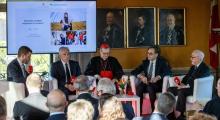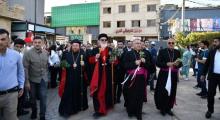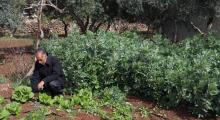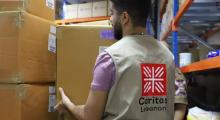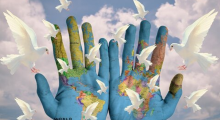Issued by the Catholic Center for Studies and Media - Jordan. Editor-in-chief Fr. Rif'at Bader - موقع أبونا abouna.org
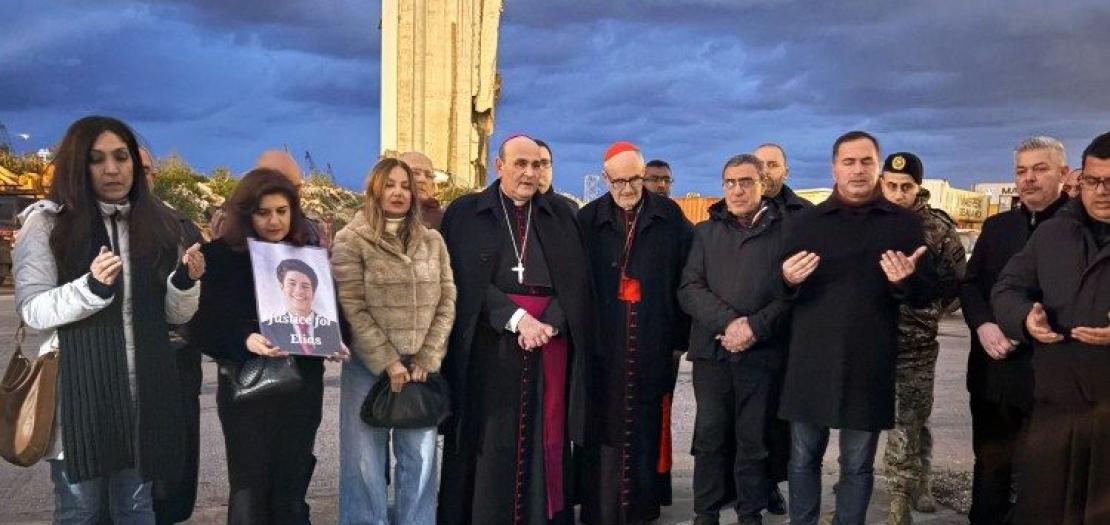
Cardinal Czerny at Beirut Port praying with families of the 2020 Explosion Victims
As night fell over Beirut’s port, the towering cranes and the ruins of the massive silos cast long shadows across the city. But amidst the darkness, one thing stood out: Elias Khoury's radiant smile. At just 15 years old, Elias was one of the youngest victims of the explosion that shook Lebanon to its core. His face, printed on a photograph held tightly by his mother, Mireille, bore the words Justice for Elias. “Look at him,” she said, her voice breaking as she spoke to Cardinal Czerny. “He looks like Carlo Acutis.”
After more than two hours in Beirut’s gridlocked traffic - made worse by the funeral of Hezbollah leader Hassan Nasrallah - Cardinal Czerny finally arrived at the port, now a symbol of tragedy for Lebanon and the wider Middle East. His visit was brief but deeply moving. He prayed at the memorial where the names of the victims are engraved in marble and shared quiet moments with grieving families. Among them was Mireille, the only one holding a photograph of her son. His curly hair and warm smile bore an undeniable resemblance to the young, soon-to-be saint.
"Justice and truth"
Other families whispered the names of their loved ones or showed pictures of them on their phones - lives lost in an explosion caused, according to authorities, by a fire in a vast stockpile of ammonium nitrate. Among those gathered was Pierre Gemayel, who lost his brother Yacoub, and lawyer Cecile Roukoz, whose brother, an employee at a shipping company, was also among the victims. She has become a leading voice in the fight for “justice and truth.”
For nearly five years, families of the dead and the more than 7,000 injured have been demanding answers - pleas that have been met with stalled investigations and what they describe as deliberate obstruction. Even Pope Francis himself joined their call when he met them at the Vatican in August 2024: "Together with you, I ask for truth and justice, which have yet to come."
A mother’s quiet strength
“We wanted justice and did everything we could to get it. But with the case at a standstill, we had to appeal to the Human Rights Council to push for an international investigation - just to uncover the truth. This was a crime against humanity,” Mireille told Vatican News. “But all we got was a statement.”
She didn’t raise her voice or speak with anger. Instead, hers was the quiet determination of a mother who had lost her son after days of fighting for his life in intensive care. Her eldest daughter, Nour, needed surgery on her hand, and Mireille herself, thrown across her home by the force of the blast, suffered severe back and rib injuries that left her in a wheelchair for months. Yet last night, she spoke of none of this. Her focus was on the future: “The investigation has resumed, and I hope - we hope - it will continue under the new government and president.”
She and Cecile repeated this to Cardinal Czerny, who listened attentively, offering each of them a warm embrace and his blessing.
Prayers and hymns
Cardinal Czerny didn’t make speeches - just gestures of solidarity, compassion, and tenderness, the same qualities Pope Francis so often emphasizes in times of suffering. Then, he prayed. Accompanied by Apostolic Nuncio Paolo Borgia, local priests, and volunteers, he knelt at the memorial as a priest led the group in an Easter hymn in Arabic. Together, they recited the Our Father before sharing quiet words of comfort.
“The visit of His Eminence means so much to us,” the victims’ families later shared. “He has been kind, understanding, and supportive. The presence of the Church, and of the Pope, is crucial.”
Leaving the port, Cardinal Czerny reflected on the pain he had witnessed: “The combination of personal tragedy and the refusal to seek truth is a great sorrow", he said.
A meeting with migrants and refugees
After leaving the port, the cardinal visited the Jesuit Refugee Service (JRS) center nearby, where he was welcomed by young Jesuit seminarian Michael Petro - known affectionately as “brother,” “abuna,” or even “hero.” There, he met with a group of over 20 migrants and refugees. They were men and women, young and old, who spent their days working as caregivers and domestic workers, but in their free time, they had become activists, leaders, and sources of support for Lebanon’s poor and displaced.
The group included people from the Philippines, South Sudan, Ethiopia, India, Sri Lanka, and Bangladesh. They spoke candidly with the cardinal, not just about their work but about the hardships they had endured. And there were many, such as fraudulent contracts, exploitative jobs, and the constant fear of deportation.
The reality of modern slavery
Mariam, a young woman from Sierra Leone, shared the harsh realities faced by foreign workers from the moment they leave their home countries. Recruiters lure them in with false promises, making them sign contracts in Arabic - documents they cannot even read - while charging them up to $3,000 in fees.
“But when they arrive in Lebanon, they find themselves trapped by ‘employers’ who make them work from 9:00am to midnight. If they try to leave, they are threatened or falsely accused of theft,” she explained. “And if they call their recruiters for help, they are told, ‘Fine, give me back my $3,000.’ But they have no papers, no way out.”
During the war, many migrants were abandoned by their employers and left to fend for themselves. Some managed to flee and found refuge at the JRS center, where they discovered not just help but a community.
A community that stands together
Despite their struggles, they have built a thriving support network - one that gathers for Mass, welcomes Buddhist prayer groups, and offers help to those in need, regardless of nationality or faith. They even organize a weekly cricket tournament, drawing 200–300 players every Sunday.
“We play from sunrise to sunset,” said Fernando. “Christians share in the joy of the Mass, and with everyone else, we share the joy of sport. It’s a way to connect.”
Cardinal Czerny was deeply moved, saying “They have organized themselves - it’s beautiful. Left alone, they would have been lost in fear, suffering, and homesickness.”
A personal present
Before leaving, Czerny encouraged the migrants to share their stories. “Communication is key," he said, “not just among yourselves but also with journalists. The world needs to hear what you have been through.” As a gesture of solidarity, he gave them an image of the Holy Family fleeing to Egypt: “It was painted by my grandmother. My family, too, were once refugees.”
Encouragement for his Jesuit brothers
That same image was later given to the Jesuit community of St Joseph, where Czerny met fellow priests involved in pastoral, educational, and social ministries. He urged them to “meet, listen, and support” their bishops: “Our role is to help them in their mission.”
In a world scarred by war and rising hostility toward migrants, he encouraged them to be “agents of hope.” He reminded them of Pope Francis’ vision in Fratelli Tutti: “This is not just theology or pastoral care—it is a call to change the world.”
Before leaving Lebanon, Czerny had one final request: “Pray for the Pope and his health.” On Sunday morning, he returned to Rome.


